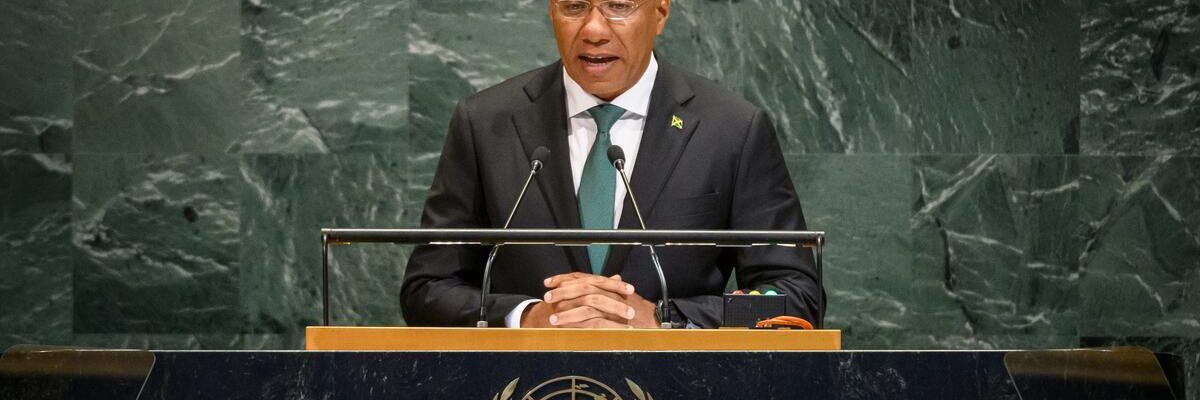

Astronomers tell us a profound and humbling truth about our cosmos: the universe is not static.
It is in a perpetual state of expansion, with galaxies rushing away from one another into an ever-widening, darkening void. The forces that once bound them are weakening in the face of this relentless, mysterious drift. Prime Minister Holness, as you settle into the familiar leather of your chair in the aftermath of the general election, I would suggest that a similar, equally powerful, expansion is happening right here in Jamaica’s political universe that you now govern.
You have been returned to office, a testament to your party’s ground game and the trust of your supporters. Yet, the numbers that secured your victory paint a more complex and troubling picture of gravitational decay. A popular majority slimmer than a razor’s edge, endorsed by roughly 20 per cent of the Jamaican electorate. To put it in the starkest terms, the overwhelming majority of the universe of eligible voters—well over 70 per cent—did not cast their ballot for you. This is not merely a fundamentally slim mandate; it is astronomical data pointing to the existence of vast, empty spaces of apathy and dissent. The space between your government and the governed has grown, and it is expanding still.
The most significant and worrying void is the one occupied by the non-voter. This is the dark matter of our Jamaican democracy—invisible in the final seat count, yet its gravitational pull fundamentally shapes the political landscape. Who are these thousands? They are not a monolithic bloc of the lazy or the uninterested. They are, one must conclude, the hopeless, the frustrated, the disillusioned, and the economically struggling. They are the citizens for whom the grand theatre of electioneering—the motorcades, the sound-system speeches, the paraphernalia, the promises etched on the humid night air—no longer resonates. Their silence is not acquiescence; it is a deafening roar of rejection for a political binary that they feel has failed to deliver a better quality of life. They have, in effect, chosen to drift away from the political centre altogether.

This expansion of the apathetic void has a direct and destabilising effect on your government’s own galaxy. A large majority, built on the intense gravity of tribal loyalty, creates a certain kind of political reality. It allows for bold, perhaps even unpopular, decisions under the assurance of a strong centripetal force. A slim majority, however, exists in a far more fragile state. Every piece of legislation, every policy shift, now carries exponentially more risk. The gravitational pull holding your administration in place is weak. The space for error has collapsed to near zero, while the space for potent, paralysing criticism has expanded outside of Gordon House to fill the vacuum. You are not so much a sun around which the political system orbits, but a star in a delicate binary system, acutely aware of the opposing pull and the immense empty spaces surrounding you.
This leads to an uncomfortable but necessary question: is the very structure of our two-party constellation itself a dying star? The relentless expansion of the non-voting universe suggests that the old political matter—the perpetual dance between the JLP and the PNP—is no longer generating enough heat and light to sustain the engagement of a growing portion of the populace. The tribal loyalties that once bound generations are weakening. In the expanding void, new celestial bodies may be forming: comets of single-issue activism, asteroids of independent thought, and perhaps, one day, new planets of political organisation that better reflect the aspirations of a 21st-century Jamaica. The duopoly can no longer take its dominion for granted.
So, how does one govern in an expanding universe? The laws of Political “Ciance” have changed. The traditional playbook of rallying one’s base, of speaking primarily to the converted, is dangerously insufficient. It would be like trying to navigate the cosmos with only a map of this little island. The task before you, Prime Minister, is not to defy the expansion—that is a fool’s errand—but to understand its forces and build within it.
Your challenge is to create policies with a gravity so compelling, so tangibly beneficial, that they can pull those drifting masses back into a common orbit. This requires a governance of substance over symbolism, of measurable outcomes over rhetorical flourish. It means focusing relentlessly on the issues that transcend the old tribal lines: the growing cost of living, the existential threat of resurgent violent crime, the creaking infrastructure, the lack of adequate government services with empathy, and the urgent need for economic mobility for the young. These are the forces that can create a new, stronger political gravity.
This mandate, such as it is, demands a more consultative, inclusive, and humble style of leadership. It requires an ear finely tuned to the silence of the disengaged, not just the cheers of the party faithful. Governing for all Jamaica has always been the stated aim, but now it is a mathematical and political necessity. You must become a prime minister for the non-voter as much as for the voter, for the sceptic as much as the supporter. This means engaging with civil society, with the private sector, and with community leaders who hold the trust your political class has lost.
The universe, Prime Minister, offers a humbling lesson. Its expansion is not a sign of imminent death, but a call for radical adaptation. It is a reminder that no centre of power is permanent and that legitimacy must be constantly earned and renewed. The electorate has delivered a result that is less a ringing endorsement and more a stark warning, writ in the faint light of receding stars.
Your task in this term is monumental. It is to craft a vision for Jamaica so luminous, so filled with the hope of genuine progress, that it can illuminate the void and pull a drifting nation back into a common and purposeful orbit. The universe is expanding. The question now is, how will all of us grow within it?







Comments